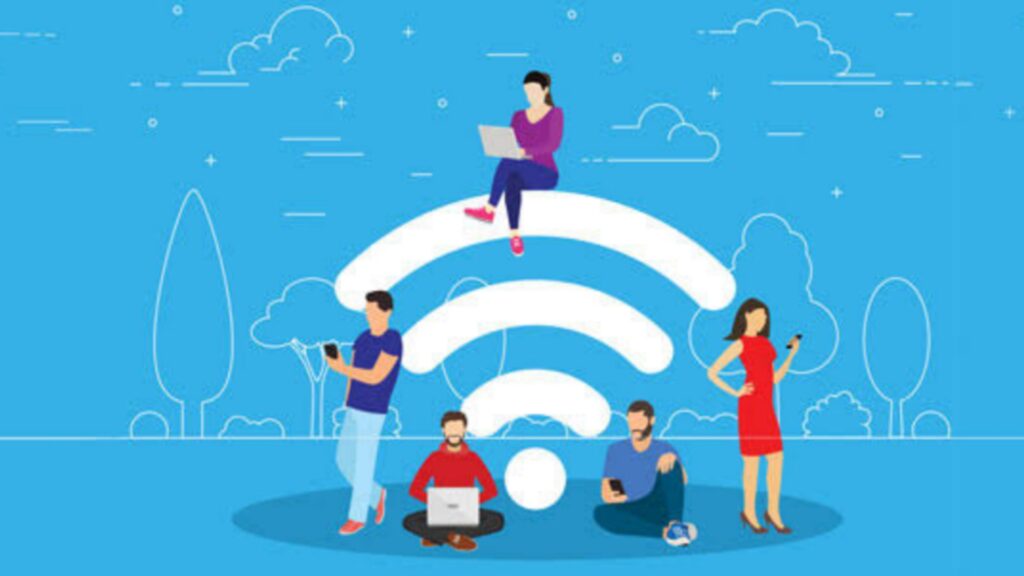Are Wi-Fi and internet are same?

If you’ve ever said, “The Wi-Fi is down,” when your Internet stopped working, you’re not alone. Many people use Wi-Fi and Internet as if they’re the same thing. They’re closely related — but they are not identical. Confusing these two can make troubleshooting harder and lead to misconceptions about how we stay connected.
This guide will break down what Wi-Fi is, what the Internet is, and how they work together. By the end, you’ll know exactly why saying “Wi-Fi is the Internet” is like saying “roads are cars.”–
S25 ultra charging speed test here.
What Exactly Is the Internet?
The Internet is a global network of millions of computers, servers, and devices all communicating with each other. It’s not a single physical thing you can point to — it’s an interconnected web of networks.
How Does It Work?
At its core, the Internet relies on data packets that move across different networks.Your Internet Service Provider (ISP) connects you to this massive system using technologies like fiber, cable, DSL, satellite, or cellular.
Routers, switches, and servers guide your requests — whether you’re loading a website, sending an email, or streaming a movie.In simple terms: The Internet is the highway system that carries information everywhere.—
What Exactly Is Wi-Fi?
Wi-Fi (short for “Wireless Fidelity”) is a technology for transmitting data wirelessly over short distances. It uses radio waves to let your devices communicate with a local router without a cable.
How Does Wi-Fi Work?
- 1. Your ISP sends Internet service to your home through a wired line (fiber, cable, or DSL).
- 2. A modem receives that service.
- 3. A Wi-Fi router then broadcasts that connection wirelessly.
- 4. Your phone, laptop, smart TV, or gaming console connects to the router via Wi-Fi.
Here’s the key: Wi-Fi is only the method of access — not the Internet itself. If your ISP’s service goes down, your Wi-Fi network still exists, but you can’t reach the Internet through it.—
Wi-Fi vs. Internet: The Main Differences
1. Definition Internet:
The global network connecting devices worldwide.
Wi-Fi: A local wireless connection to that network.
2. Function Internet:
Provides the actual content, websites, and data you access.
Wi-Fi: Provides a convenient wireless link to your modem or router.
3. Range Internet:
Exists everywhere as long as there’s infrastructure to deliver it.Wi-Fi: Works only within your router’s coverage area (usually 50-150 feet indoors).
4. Independence
You can have Internet without Wi-Fi — using wired Ethernet or mobile data.
You can have Wi-Fi without Internet — devices can still communicate locally, like printing wirelessly or sharing files.—
Common Misunderstandings About Wi-Fi and Internet
- 1. “My Wi-Fi is slow, so my Internet is bad.”Not always true. Your Internet speed depends on your ISP, but your Wi-Fi speed depends on your router’s range, interference, and the number of devices connected.
- 2. “I need Wi-Fi to go online.”Not necessarily. Mobile data lets you access the Internet without Wi-Fi.
- 3. “Public Wi-Fi is free Internet.”It’s just free access to someone else’s Internet connection. If their Internet is slow, your connection will be slow too — no matter how strong the Wi-Fi signal looks.
- 4. “No Internet means no Wi-Fi.”Wi-Fi networks still work even if the Internet is down. You can still stream locally stored videos to your TV or use wireless printers.—
Real-World Examples to Make It Clear
Example 1: Coffee Shop Wi-Fi
You connect your laptop to the coffee shop’s Wi-Fi. Suddenly, you can’t load websites even though your Wi-Fi icon is full.
What’s happening?
The Wi-Fi is fine — your device is connected to the router.
The Internet is the problem — the coffee shop’s ISP may be down.
Example 2: Home Ethernet Connection
Your desktop PC connects to the modem using an Ethernet cable. Even if you turn off Wi-Fi entirely, your PC is still online. This proves you don’t need Wi-Fi to use the Internet.
Example 3: Smart Home Devices
You have smart bulbs and a wireless printer connected to your home Wi-Fi. If your Internet goes out, these devices can still talk to each other because they only need the local Wi-Fi network, not the Internet.—
Technical Insight: How They Interact
The Internet is like a giant library full of books (websites and data).
Your ISP is the librarian giving you access to that library.
Your router and Wi-Fi are the reading desk and wireless lamp — they help you sit comfortably and access the library without cables.
If the library closes (Internet outage), your desk and lamp (Wi-Fi) are still there, but you can’t get new books.—
Why Knowing the Difference Matters
1. Better Troubleshooting
When your connection drops, check:If Wi-Fi is disconnected, the issue is with your router or local device.If Wi-Fi works but you can’t access websites, the issue is with your ISP or modem.
2. Smarter Upgrades
If your Internet is slow, upgrading your Wi-Fi router alone won’t fix it. You need a faster Internet plan from your ISP. Conversely, if your Internet is fast but Wi-Fi is weak, you need a better router or range extender.
3. Security Awareness
Wi-Fi security is your responsibility — you set the password on your router.
Internet security is broader — it involves how data is transmitted online, requiring antivirus tools, firewalls, and safe browsing practices.—
Expert Opinions and Statistics
According to Cisco’s Annual Internet Report, by 2025 there will be over 5 billion Internet users globally, but most of them will access the Internet via wireless technologies — primarily Wi-Fi and mobile data.
A study by Pew Research Center found that over 30% of respondents couldn’t clearly distinguish between Wi-Fi and Internet service. This confusion often leads to unnecessary ISP support calls.
Networking experts emphasize that Wi-Fi is only a convenience layer. As Mark Murphy, a senior network engineer at Gartner, explains:
> “Your Wi-Fi router is like a cordless phone base station. It’s not the phone line itself, just the way you talk on it without wires.”—
Which is more important: Wi-Fi or Internet speed?
Both matter, but for different reasons. Internet speed determines how fast you download or stream data. Wi-Fi strength determines how efficiently that speed reaches your devices wirelessly.—
The Bottom Line So, is Wi-Fi and the Internet same?
Absolutely not.
The Internet is the worldwide network of data.
Knowing the difference helps you troubleshoot better, choose the right equipment, and avoid frustration when something goes wrong. Next time someone says “The Wi-Fi is broken,” you’ll know whether it’s really a Wi-Fi problem — or an Internet problem in disguise.
Wi-Fi is just a convenient way to connect to that network without cables.
